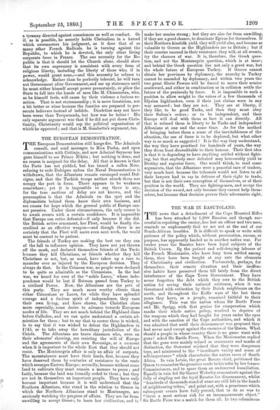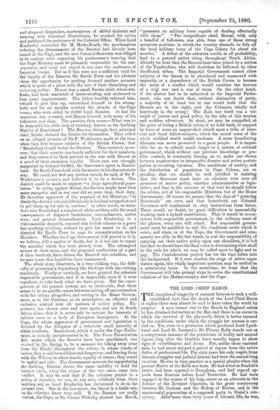THE WAR IN BASUTOLAND.
THE news that a detachment of the Cape Mounted Rifles has been attacked by 1,200 Basutos, and though suc- cessful in repulsing the enemy, has lost an officer and two men,
reminds us unpleasantly that we are not at the end of our South-African troubles. It is difficult to speak or write with patience of the policy which, without provocation, excuse, or purpose, has apparently landed us in another native war. For twelve years the Basutos have been loyal subjects of the British Crown. By, the patient and self-denying labours of the French Missionaries, who have long been settled among them, they have been taught at any rate the elements of Christianity and civilisation. Fortunately, perhaps, for themselves, their remote situation and their inoffen- sive habits have preserved them till lately from the direct interference of the Cape Town Government. They have never forgotten the debt which they owe to the British nation for saving their national existence, when it was threatened with extinction by their Dutch neighbours on the north, and throughout the Kaffir wars of the last three years they have, as a people, remained faithful to their allegiance. This was the nation whom Sir Bartle Frere and Mr. Sprigg, with that genius for exasperation which marks their whole native policy, resolved to deprive of the weapons which they had bought for years under the eyes and with the sanction of the Cape authorities, and which it was admitted that until their disarmament was proposed they had never used except against the enemies of the Queen. What
should a people in whose country there is no game want with
guns ? asked Sir Bartle Frere. When the Missionaries replied that the guns were mainly valued as ornaments and marks of distinction, the Governor rejoined that they were dangerous toys, and ministered to the "inordinate vanity and sense of self-importance" which characterise the native races of South Africa. In vain Letsie, the great Basuto chief, petitioned the Queen to remember the promises made to his tribe by her former Commissioners, and to spare them an undeserved humiliation. Equally in vain did Sir Garnet Wolseley remonstrate against the folly of singling out the loyal Basutos for disarmament, whilst "hundreds of thousands stand of arms are still left in the hands of neighbouring tribes," and point out, with a prescience which subsequent events have fully proved, that to do so was to "incur a moat serious risk for an incommensurate object." Sir Bartle Frere was a match for them all. In two voluminous
and eloquent despatches, masterpieces of skilful dialectic and teeming with historical illustrations, he crushed his critics and paralysed the resistance of the Colonial Office. When Lord Kimberley succeeded Sir M. Hicks-Beach, the proclamation ordering the disarmament of the Basutos had already been issued at the Cape, and the new Colonial Secretary was obliged to be content with repeating his predecessor's warning that the Cape Ministry must be primarily responsible for the con- sequences, and must not expect in any case the assistance of Imperial troops. But as if this were not a sufficient trial for the loyalty of the Basutos, Sir Bartle Frere and his advisers chose the opportunity for putting forward another measure which is quite of a piece with the rest of their disturbing and irritating policy. Morosi was a small Basuto chief, whose eon, Dada, had been convicted of horse-stealing and sentenced to four years' imprisonment. The father forcibly released him, refused to give him up, entrenched himself in his strong- hold, and for six months resisted the attacks of the Cape troops, who were aided by 2,000 loyal Basutos. At last his mountain was stormed, and Morosi himself, with many of his followers, was slain. The question then arose,—What was to be done with his little strip of territory, known as the Quthing District of Basutoland ? The Basutos, through their principal chief, Letsie, claimed the district for themselves. They relied on- an alleged promise of Sir P. Wodehouse, made at the time when they first became subjects of the British Crown, that " Basutoland should be for the Basutos." They asserted, more- over, that their country was barely sufficient for their numbers, and they referred to their services in the war with Morosi as a proof of their unshaken loyalty. Their case was strongly supported by Colonel Griffith, the Governor's agent in Basuto- land. Sir Bartle Frere dealt with the matter in his characteristic way. He could not find any written record, he said, of Sir P. Wodehouse's promise, and believed it to be a fiction. The district could be made to support "a large agricultural popu- lation." In acting against Morosi, the Basutos might have been more energetic, and in any case did no more than their duty. He therefore approved of the proposal of his Ministers, " to divide the district into suitable lots for individual occupation and to put them up for sale by auction ;" in other words, to intro- duce into Basutoland a number of white settlers, with the usual consequences of disputed boundaries, encroachments, native ware, and general demoralisation. Lord Kimberley, in a statesmanlike despatch, exposed this foolish scheme to a grave but scathing criticism, refused to give his assent to it, and directed Sir Bartle Frere to urge its reconsideration on his Ministers. Whether the Cape Government will persist in it is, we believe, still a matter of doubt, but it is too late to repair the mischief which has been already done. The attempted seizure of their arms, and the proposed confiscation of a part of their territory, have driven the Basuto into rebellion, and we now learn that hostilities have commenced.
The whole story illustrates, in a very striking way, the diffi- culty of governing a dependency like the Cape with our existing machinery. Wisely or unwisely, we have granted the colonists responsible government, and it is impossible, even if it were expedient, to take back what we have given. But the conse- quences of the present system are so intolerable, that there seems to be no middle course between cutting off our connection with the colony altogether, and vesting in the Home Govern- ment, or in the Governor as its mouthpiece, an effective and exclusive control over all matters of native policy. Ex- perience has shown over and over again, and not in South Africa alone, that it is never safe to entrust the interests of inferior races to a body of European immigrants. At the Cape, the whole apparatus of government and legislation is directed by the delegates of a relatively small minority of white residents. Basutoland, which is under the Cape Parlia- ment, is entirely unrepresented in it. The Peace Preservation Act, under which the Basutos have been proclaimed, was avowed by Mr. Sprigg to be a measure for taking away arms from the Blacks throughout the colony, in whose hands, of course, they would be worthless and dangerous; and leaving them with the Whites, in whose hands, equally of course, they would be useful and safe. The Government measure for repopulating the (lathing District shows the same inability to hold the balance fairly, when the claims of the two races come into conflict. It may be said that if the colonists persist in a policy of injustice, we can, at any rate, withhold from them military aid, as Lord Kimberley has threatened to do in the present case. But in the last resort, the threat is a futile one, as the colonies know very well. If the Basutos are really united, the Cape, as Sir Garnet Wolssley showed last March, " poasesses no military force capable of dealing effectually with them." " The insignificant chief, Morosi, with only a handful of followers, was able, from one of those strong mountain positions in which the country abounds, to defy all the local military force of the Cape Colony for about six months." A defeat of the colonists would, in all probability, lead to a general native rising throughout South Africa. Already we hear that the Basutos have been joined by a section of the Tambookies, who will doubtless be followed by other disaffected tribes. The Imperial Government cannot allow subjects of the Queen to be plundered and massacred with impunity, or a dependency of the British Crown to become the scene of a conflict which would combine the horrors of a civil war and a war of races. On the other hand, if the matter had to be submitted to the Imperial Parlia- ment, who can doubt that, without distinction of party, a majority of at least ten to one would hold that the Basutos are in the right, and the Colonists wholly and hopelessly in the wrong ? The Zulu war itself was a tri- umph of justice and good policy, by the side of this wanton and reckless adventure. In short, we may be compelled, at the price of losing a British colony if we hold back, to support by force of arms an unprovoked attack upon a tribe of inno- cent and loyal fellow-subjects, which the moral sense of the whole civilised world would condemn. A more humiliating dilemma was never presented to a great people. It is impost- sible for us to submit much longer to a system of colonial government, which without our previous knowledge or pos- sible control, is constantly forcing us to make our choice between acquiescence in irreparable disaster and active partici- pation in revolting injustice. The conditions of society, and the distribution of population in Cape Colony, are so peculiar, that we should be well justified in insisting that the Governor must have an absolute veto over all measures of native policy, whether administrative or legis- lative, and that in the exercise of that veto he should follow the advice, not of his responsible Ministers, but of the Home Government. Of course we assume that the days of " prancing Proconsuls" are over, and that henceforth our Colonial Governors will condescend to obey instructions from home. There would, no doubt, be great difficulties in successfully working such a hybrid constitution. That it would be incon- sistent with responsible government, in the ordinary sense of the phrase, every one will admit. But responsible govern- ment must be modified to suit the conditions under which it exists. and when, as at the Cape, the Government and com- munity are able, in the last resort, to cast the responsibility of carrying out their native policy upon our shoulders, it is but fair that we should have the final voice in determining what shall' be the ends for which we may be called upon to fight and to pay. The Confederation project has for the time fallen into the background. If it ever reaches the stage of active nego- tiation again, this vitally important question may be settled on a satisfactory basis. In the meantime, we trust that the Government will take prompt steps to revise the constitutional relations of the Mother-country and the Cape.



































 Previous page
Previous page